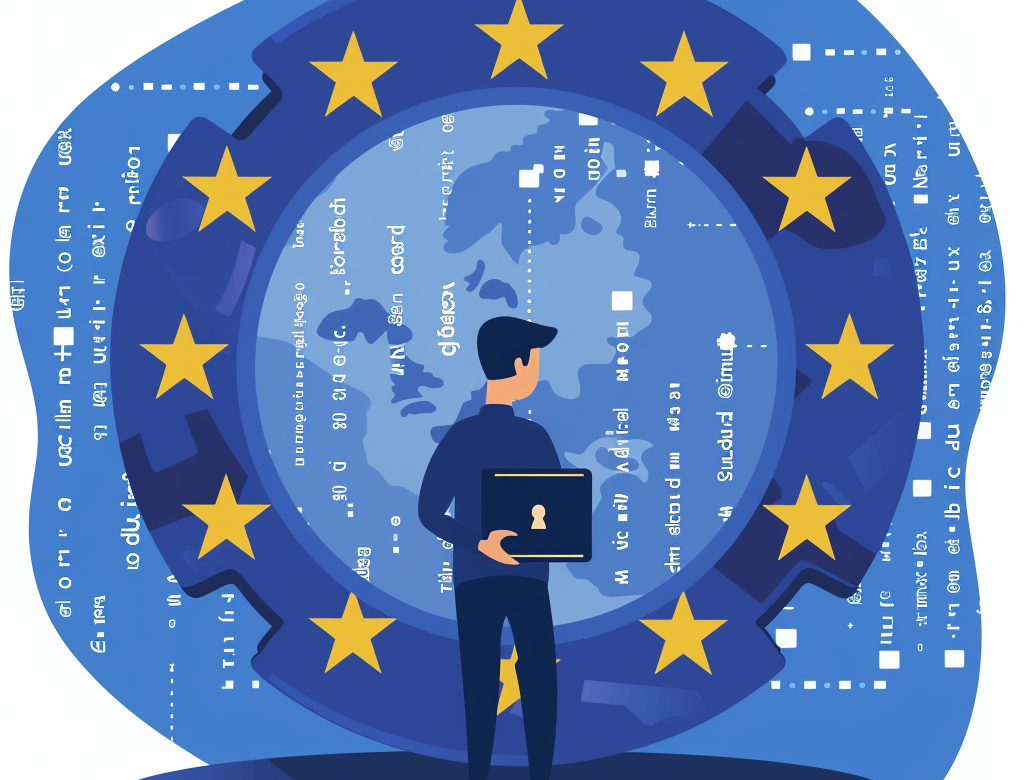Updated: 1 November, 2024
17 June, 2022
In the era of data-driven innovation, software development plays a critical role in managing sensitive personal information. However, the implementation of the General Data Protection Regulation (GDPR) has introduced complex challenges for software developers seeking to ensure their products comply with this far-reaching regulation. At Codific, we bring over a decade of experience crafting secure software that aligns with GDPR standards across diverse industries, including Ed-Tech, HR-tech, and AppSec. Our deep understanding of data privacy and security has positioned us at the forefront of compliance with evolving regulations. To help you navigate the intricacies of GDPR compliance in software development, we’ll share our expertise in this comprehensive guide.
Key takeaways
- The GDPR is a complex regulation that imposes stringent requirements on organizations worldwide.
- To develop GDPR-compliant software, it’s crucial to understand the regulation’s fundamental terms.
- The GDPR’s 7 data protection principles are the foundation of compliance. These are:
- Lawfulness, fairness and transparency.
- Purpose limitation.
- Data minimization.
- Accuracy.
- Storage limitation.
- Integrity and confidentiality.
- Accountability.
- Codific specializes in building secure software that meets GDPR standards.
- Codific’s Attendance Radar app exemplifies GDPR compliance principles.
Delving into the GDPR and its key definitions
The GDPR stands for General Data Protection Regulation, the EU’s landmark data privacy and security law that imposes stringent requirements on organizations worldwide. It applies to any organization that targets or collects data related to individuals residing in the EU, regardless of their location. Non-compliance can result in hefty fines, making achieving GDPR compliance a crucial endeavor.
For GDPR compliance in software development, it’s essential to grasp the fundamental legal terms defined within the regulation:
- Personal Data: Any information that can be linked to an identifiable individual, including names, email addresses, ethnicity, gender, biometric data, and other sensitive information. Pseudonymized data, which can be linked to an individual with reasonable effort, also falls under this definition.
- Data Processing: Any operation performed on personal data, whether automated or manual. This encompasses collection, storage, retrieval, use, disclosure, erasure, or destruction of personal data.
- Data Subject: The individual whose personal data is being processed.
- Data Controller: The organization or individual responsible for deciding why and how personal data will be processed.
- Data Processor: A third-party organization that processes personal data on behalf of the data controller.
To achieve GDPR compliance, it’s essential to integrate the regulation’s data protection principles into your software development workflow. These principles, including lawfulness, fairness and transparency, purpose limitation, data minimization, accuracy, storage limitation, integrity and confidentiality, and accountability, are the foundation of GDPR compliance. In the next section, we’ll explain these principles and explore how to incorporate them in your development process.
7 principles for GDPR compliance in software development
To achieve GDPR compliance, it’s essential to integrate the regulation’s data protection principles into your software development workflow. These principles, including lawfulness, fairness and transparency, purpose limitation, data minimization, accuracy, storage limitation, integrity and confidentiality, and accountability, are the foundation of GDPR compliance. In the next section, we’ll explain these principles and explore how to incorporate them in your development process.
1 Lawfulness, Fairness, and Transparency
Data processing must always be conducted lawfully, fairly, and transparently. This means that data subjects should be informed about how their personal data is being collected, used, and stored, and they should have the right to access, rectify, and erase their data.
How to implement in software development:
- Implement clear and accessible privacy notices that inform users about how their data is being collected, used, and stored.
- Obtain explicit consent from users before collecting their personal data.
- Provide options for users to control how their data is used.
- Implement clear and transparent data retention policies.
2 Purpose limitation
Personal data should only be collected for specified, explicit, and legitimate purposes. Additional and future processing of data should still follow these initial purposes.
How to implement in software development:
- Identify the specific and legitimate purposes for collecting personal data.
- Collect only the minimum amount of personal data necessary to achieve the specified purposes.
- Restrict the use of personal data to the purposes for which it was collected.
3 Data Minimization
Only the minimum amount of personal data necessary for the specified purposes should be collected. This means avoiding collecting excessive or irrelevant data.
How to implement in software development:
- Conduct a privacy impact assessment to identify and minimize the collection of personal data.
- Implement data minimization principles throughout the software development lifecycle.
- Regularly review and reassess the need to collect personal data.
4 Accuracy
Personal data should be accurate and kept up to date. Organizations should take reasonable steps to rectify any inaccurate data promptly.
How to implement in software development:
- Implement data validation and data quality checks to ensure data accuracy.
- Provide mechanisms for users to correct or update their personal data.
- Regularly review and update personal data to ensure accuracy.
5 Storage Limitation
Personal data should be kept for no longer than is necessary for the specified purposes. Organizations should implement appropriate measures to dispose of or anonymize personal data when it is no longer needed.
How to implement in software development:
- Establish clear data retention policies that specify the retention period for different categories of personal data.
- Implement automated data scrubbing or deletion mechanisms to remove outdated or no longer needed data.
- Provide options for users to request data deletion or anonymization.
6 Integrity and Confidentiality
Personal data should be processed in a manner that ensures appropriate security, including protection against unauthorized or unlawful processing and against accidental loss, destruction, or damage. Organizations should implement appropriate technical and organizational measures to protect data security.
How to implement in software development:
- Implement data encryption and access controls to protect personal data from unauthorized access.
- Regularly update security software and patches to mitigate vulnerabilities.
- Conduct regular security audits and penetration tests to identify and remediate security weaknesses.
- Analyzing and working towards improving the application security of your software using renowned AppSec models like SAMM and a management tool like SAMMY to manage the process.
7 Accountability
The data controller must be able to demonstrate compliance with the GDPR. This includes keeping records of data processing activities and being able to respond to data subject requests and data breaches.
How to implement in software development:
- Document data processing activities, including the purposes, categories of data, data recipients, and retention periods.
- Implement incident response procedures to identify, contain, and remediate data breaches.
- Conduct regular compliance assessments to ensure ongoing adherence to GDPR requirements.
By incorporating these seven principles into your software development process, you can effectively protect the personal data of your users and meet the requirements of the GDPR.
How do we apply the 7 principles in our applications?
To further illustrate how you can apply the 7 principles in your own software development process, let me briefly explain how we did it in one of our Ed-Tech solutions, Attendance Radar, which is a mobile student attendance tracking app.
a mobile student attendance tracking app.
- Lawfulness, fairness and transparency: We apply this principle in Attendance Radar by asking for the consent of data subjects to process their data. When the users first download and register an account in the app, we ask for them to agree to our Terms and Conditions. In this Terms and Conditions we outline our privacy policy that explains what data we collect and how it is collected, used and stored.
- Purpose limitation and data minimization: We apply these two principles simultaneously. That is because we only collect the minimal amount of data necessary for the purpose of student attendance tracking. Moreover, we inform the users of the purpose for which we are collecting the data and explain why this data is required for it in our privacy policy.
- Accuracy: We allow users to modify some of their personal information like their name, surname and student numbers. Additionally, we implement data validation and quality checks for accuracy assurance.
- Storage limitation: Data is stored until it is deleted by a user. Trainers can delete data on their courses and sessions, including the student enrollments onto these courses. Additionally, both trainers and students can at any point delete their account. Upon deletion, data is kept for 30 days and then anonymized.
- Integrity and confidentiality: Data encryption and access controls are used to protect data from unauthorized access. Additionally, regular security audits and penetration tests are carried out to identify and help to patch security vulnerabilities.
- Accountability: Data processing activities of Attendance Radar are documented and incident response procedures have been set up.
What other software do we build with GDPR in mind?
Videolab is used by top universities, academies and hospitals to put the care in healthcare. Communication skills, empathy and other soft skills are trained by sharing patient interviews recordings for feedback.
SARA is used by top HR-Consultants to deliver team assessments, psychometric tests, 360 degree feedback, cultural analysis and other analytical HR tools.
SAMMY is a Software Assurance Maturity Model management tool. It enables companies to formulate and implement a security assurance program tuned to the risks they are facing. That way other companies can help us build a simple and safe digital future. Obviously our AppSec program and SAMMY itself is built on top of it.
We believe in collaboration and open innovation, we would love to hear about your projects and see how we can contribute in developing secure software and privacy by design architecture. Contact us.




